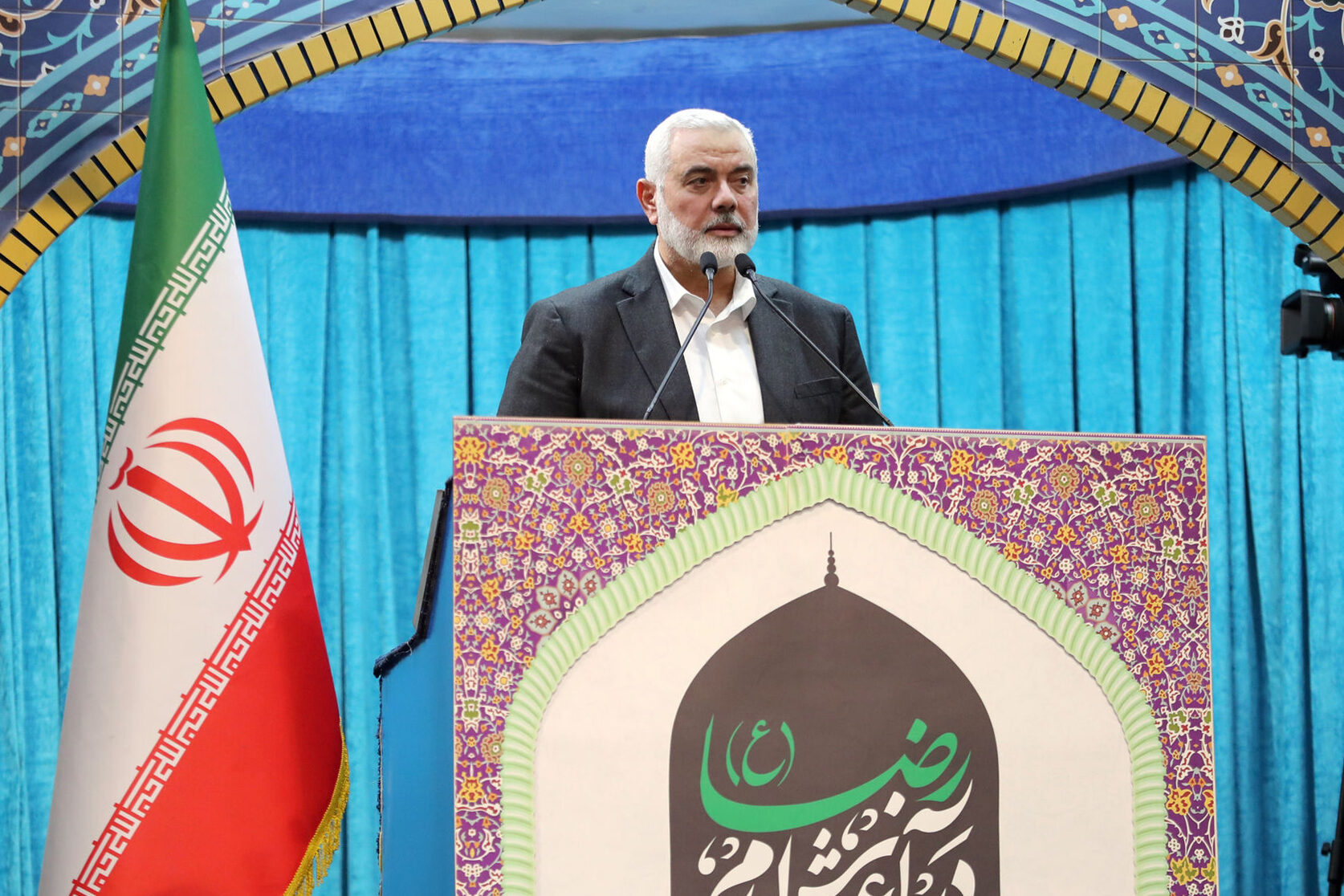Palestinians Don’t Want Hamas To Rule Postwar Gaza
After 17 years of ruthless Hamas control of the Gaza Strip and eight months since the start of the ongoing war, Palestinians in Gaza are ready for a change
Eight months since Israel’s war with Gaza broke out, things are heating up again. Israel’s carefully calculated war of attrition with Hezbollah seems poised to turn into all-out war.
Israel hasn’t shown any intention of ending the war in Gaza, and Hezbollah is losing patience. Hezbollah intends to move in to reduce Israel’s military pressure on the Gaza Strip in general and Hamas and Palestinian Islamic Jihad in particular. Just consider what Hezbollah chief Hassan Nasrallah had to say last Wednesday. In what amounted to a warning shot to the government of Israel, Nasrallah pleaded, in his way, for Israel to avoid an open confrontation that would be highly destructive to Israel as well as Lebanon.
Nasrallah was clear in his threats. He didn’t mean he would attack Israel the following morning. On the contrary, he wanted to ensure that the Israeli decision-makers understood his intention clearly and beyond any doubt. If the war continues in Gaza, Hezbollah will no longer stay silent.
Only two days before his speech, Nasrallah dispatched one or more drones over Haifa to scan every sensitive installation in the city. He then aired the video as a way of letting Israel know that Hezbollah has accurate coordinates for innumerable targets.
Let’s face it: Israel can’t fight on more than one front at a time. What happened in the June 1967 war is history. It will never repeat itself. Back then, Israel fought on three fronts, each one far from the home front. Israel also designed the attack, its timing, and its targets. These days, other parties have a role in shaping the course of Israeli wars, including Hamas, Palestinian Islamic Jihad, Hezbollah, the Houthis, and certainly Iran, which is pulling the strings from afar.
What can we take from all the above? On the one hand, there is Yahya Sinwar, Hamas’ strongman in Gaza, who seems to be the only one calling the shots down there. He feels he has nothing to lose, joining Benjamin Netanyahu on a joint walk down a suicidal path. Of course, that path may not endanger the leaders personally as much as it endangers their peoples as a whole.
Until recently, it was clear that neither Sinwar nor Netanyahu wanted a speedy end to the war. However, after President Biden outlined what he said was an Israeli draft plan for a cease-fire and prisoner exchange in Gaza, Hamas showed signs of caving in to pressure from the three mediators—the US, Egypt, and Qatar. It said the draft was acceptable, although it added a few remarks and questions.
Give the gift of hope
We practice what we preach:
accurate, fearless journalism. But we can't do it alone.
- On the ground in Gaza, Syria, Israel, Egypt, Pakistan, and more
- Our program trained more than 100 journalists
- Calling out fake news and reporting real facts
- On the ground in Gaza, Syria, Israel, Egypt, Pakistan, and more
- Our program trained more than 100 journalists
- Calling out fake news and reporting real facts
Join us.
Support The Media Line. Save democracy.
Israel, on the other hand, has failed to endorse the cease-fire. Netanyahu zigzagged around the question to avoid addressing the plan, hoping Hamas would reject it and subsequently exempt him from endorsing what he coauthored with the Americans. What followed was scandalous. The mediators and plenty of other countries around the world pressured Hamas while ignoring Israel, as if they took Israel’s endorsement of the cease-fire for granted. Well, they erred.
People in Gaza want this war to end ASAP. They know they have lots of responsibilities ahead, the least of which are to check on family members who may have survived the fighting, visit the wounded, and search for a place to settle.
Hamas is not in its comfort zone in Gaza at all. People I speak to in Gaza say they can hardly find those who openly support Hamas or Sinwar. Most Palestinians in Gaza are intimidated by the heavy presence of undercover Hamas operatives, primarily members of the police force. They are unable to voice any criticism. The moment any Arab or foreign television channel interviews Palestinians, they immediately praise the resistance in Gaza. They are afraid their criticism would be interpreted as giving into Israeli military pressure, or, much worse than that, be considered collaboration with Israel.
Hiding animosity toward Hamas in public while voicing criticism behind closed doors has become a way of life for most of the people in Gaza, many of whom suddenly found themselves displaced, homeless, and bereaved since the outbreak of the war. Although they primarily blame Israel for what happened, they also blame Hamas for not preparing them for what would come after the October 7 raid. They now see Hamas as unfit to continue its control of the Gaza Strip because it failed to provide them with appropriate shelter, drinking water, and food through the last eight months.
This is precisely what makes Palestinians interested in an alternative to Hamas’ authority in postwar Gaza. Despite the grudges many Palestinians in Gaza hold against the Palestinian Authority (PA), they still see a return of the PA to Gaza and reunification of Gaza and the West Bank as the best option.
Contacts in Gaza who belong to several Palestinian factions, not necessarily including Fatah, the leading party in the West Bank, tell me that 17 years of ruthless Hamas control of the Gaza Strip is too much to tolerate. They agree that there can be no governing role for Hamas in any postwar scenario in Gaza. They speak highly of what the PA did in the Gaza Strip between its founding in 1994 and when Hamas took control in the June 2007 military coup. Back then, life was normal, businesses flourished, and people had individual and collective liberties. Since Hamas took over, nearly all of that disappeared, and the little that was left was wiped out since the war began.
The situation in Gaza is awkward because the people who voted Hamas into the Legislative Council in the 2006 elections are the same ones who are now highly disappointed in the movement and its activities in the Gaza Strip, including its 2007 military coup. Some thought Hamas’ “reforms and change” ticket in the 2006 election campaign was genuine and honest, but it turned out to be little more than a ticket to enter the Legislative Council without taking on any of the actual responsibilities of governance.
Hard-core members of Hamas don’t think their movement is going to disappear after the war. Israel’s army has caused irreparable damage to its military wing, but most of the political leadership is alive and well in Doha. Some believe the movement can resurrect in postwar Gaza the same way the Muslim Brotherhood has survived many setbacks since its founding in 1928.
In its founding charter, Hamas said it was the Palestinian extension of the Muslim Brotherhood. The Muslim Brotherhood believes that taking control of any Arab country can be done through two steps. The first step is violence, which the Muslim Brotherhood exercised in Egypt for years, culminating with the assassination of Egyptian Prime Minister Mahmoud Fahmy El Nokrashy Pasha in 1948.
The second step is the control of democratic elections. Once the Muslim Brotherhood comes to power in a country, elections should be shut down, keeping the party in power forever. Hamas followed that rule when it won the 2006 elections in Gaza. Its designated foreign minister at the time, Mahmoud al-Zahar, said, “We won the elections thanks to our supporters. Who said elections should take place once every four years? The last PA election took place in 1996. We may have elections in ten years from now or even more.” In fact, no elections have been held in Gaza since 2006.
With this kind of mentality, Hamas can never play a partner role alongside other Palestinian factions in running the PA or a Palestinian state. Hamas’ doctrine is built on exclusion and rejection of the other. All attempts to end the split and reunify the West Bank with the Gaza Strip have failed, mainly because Hamas never wanted to share authority with the Palestine Liberation Organization but instead preferred to keep the whole cake for itself. Attempting to share with Hamas has never worked, and it won’t work in the future, either.
Hamas will survive as an Islamist school of thought, but it cannot survive as a power running the Gaza Strip, no matter how long the war continues. The Palestinian leadership, the Arab countries, and many countries around the world are frankly doing Hamas a big favor by designing a specific role for the movement in a postwar Gaza. Even the US is ready to consider incorporating a tamed Hamas into the government institutions of the PA or a Palestinian state. Yet, the question is not whether all these countries support this idea. It is whether Hamas accepts it.
Judging from past experiences, Hamas might wake up one day and become a sufficiently pragmatic movement, one ready to take on partnership with others. But after years or decades, Hamas will change its mind about that. Ultimately, Hamas is an untrustworthy movement that cannot play in tune with the rest of the orchestra. Those who think Hamas can become a disciplined partner of a future Palestinian political system should start preparing for new rounds of violence carried out by Hamas or some of its factions. Does this sound apocalyptic? Yes, it does. The overall situation in Gaza is so dark, death comes so fast, and destruction is almost everywhere.




